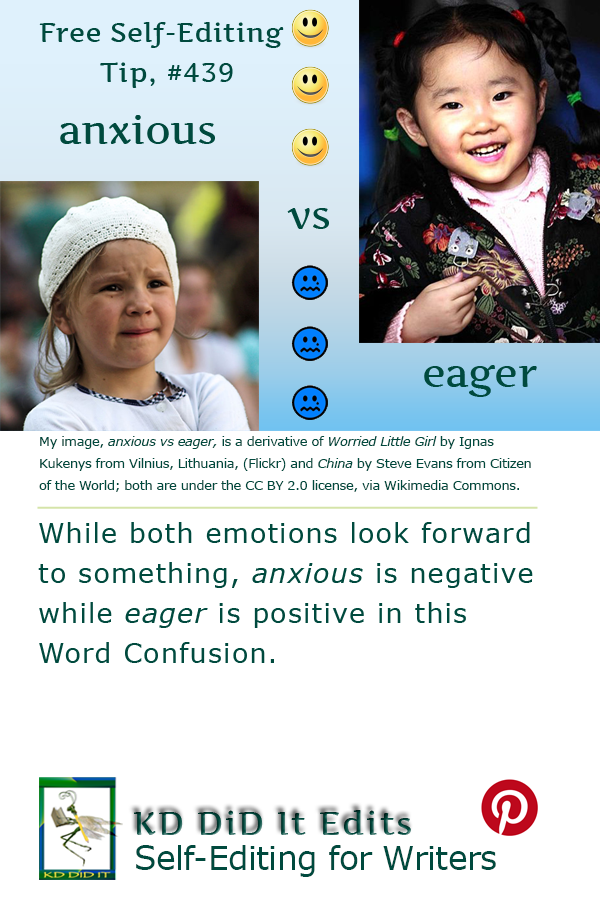Essentially anxious and eager mean the same thing: to look forward to something. The difference is that anxious carries negative connotations while eager is at the other end of the emotional scale with positive connotations.
When one is worried about something, concerned about how a future something will turn out, one is anxious. You know, like how you feel about getting your book done and published. How many readers will buy your book. If you’ll get enough reviews posted. If… That’s anxious.
Excited to do something, looking forward to it with happiness is eagerness, a wholehearted desire for something, and smiling in anticipation instead of pacing the floor!
I know I’d rather be eager about the publication of my book as opposed to anxious about it!
Word Confusions . . .
. . . started as my way of dealing with a professional frustration with properly spelled words that were out of context in manuscripts I was editing as well as books I was reviewing. It evolved into a sharing of information with y’all. I’m hoping you’ll share with us words that have been a bête noire for you from either end.
If you found this post on “Anxious versus Eager” interesting, consider subscribing to KD Did It, if you’d like to track this post for future updates.
| Anxious | Eager |
|---|---|
 — |
 — |
| Part of Grammar: | |
| Adjective | Adjective |
| anxious about. . . a concern, preferably not to do something
Experiencing worry, unease, or nervousness, typically about an imminent event or something with an uncertain outcome
[Usually used with an infinitive] Wanting something very much, typically with a feeling of unease |
[Of a person] Wanting to do or have something very much
|
| Examples: | |
| She was extremely anxious about her exams.
There were some anxious moments. The company was anxious to avoid any trouble. My parents were anxious that I get an education. |
The man was eager to please.
They were young intellectuals eager for knowledge. Small eager faces looked up and listened. He was such an eager beaver. |
| Derivatives: | |
| Adjective: quasi-anxious, quasi-anxiously, unanxious Adverb: anxiously, unanxiously, unanxiousness Noun: anxiousness |
Adverb: eagerly Noun: eagerness |
| History of the Word: | |
| Its first known use was circa 1616.
Early 17th century from the Latin anxius from angere meaning to choke |
Middle English from the Old French aigre meaning keen from the Latin acer or acr- meaning sharp, pungent.
You might also think of it as sharp to the senses, pungent, or sour. |
C’mon, get it out of your system, bitch, whine, moan . . . which words are your pet peeves? Also, please note that I try to be as accurate as I can, but mistakes happen or I miss something. Email me if you find errors, so I can fix them . . . and we’ll all benefit!
Satisfy your curiosity about other Word Confusions on its homepage or more generally explore the index of self-editing posts. You may also want to explore Book Layout & Formatting Ideas, Formatting Tips, Grammar Explanations, Linguistics, Publishing Tips, the Properly Punctuated, Writing Ideas and Resources, and Working Your Website.
Resources for Anxious versus Eager
Apple Dictionary.com
Pinterest Photo Credits:
Worried Little Girl by Ignas Kukenys from Vilnius, Lithuania, (Flickr) and China by Steve Evans from Citizen of the World; both are under the CC BY 2.0 license, via Wikimedia Commons.
Revised as of 3 Apr 2024
By: Kathy Davie

